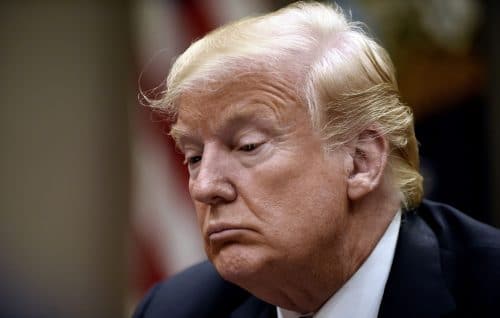Can We Get an Annulment Instead of an Impeachment?
COMMENTARY

The only way I can see the end of the Donald Trump presidency is if there’s overwhelming evidence he rigged the 2016 election — in which case impeachment isn’t an adequate remedy. His presidency should be annulled.
Let me explain.
Many people are convinced we’re already witnessing the beginning of the end of Trump. In their view, bombshell admissions from Trump insiders with immunity from prosecution, combined with whatever evidence special counsel Robert Mueller uncovers about Trump’s obstruction of justice and his aides’ collusion with the Russians, will all tip the scales. Democrats will take back the House and begin an impeachment, and the evidence of impeachable offenses will put enough pressure on Republican senators to send Trump packing.
I don’t believe this for a moment.
First, the Senate has never in history convicted a president of impeachment.
Second, even if Democrats flip the House in November, Republicans will almost certainly remain in control of the Senate — and so far they’ve displayed the integrity of lizards.
Third, Fox News and the rest of the right-wing sleaze media will continue to distort and cover up whatever the evidence shows — convincing 35 percent to 40 percent of Americans, along with most Republicans, that Trump is the innocent victim of a plot to remove him.
Finally, Trump himself will never voluntarily resign, as did Nixon. He’ll lie and claim a conspiracy to unseat him.
Trump has proven himself a superb conman, an entertainer-demagogue capable of sowing so much confusion and instigating so much hate and paranoia that he has already survived outrages that would have broken any garden-variety loathsome president — Helsinki, Charlottesville, children locked in cages at the border, firings and cover-ups, racist slurs, clear corruption.
In all likelihood, we’ll have him for another two and a half years.
Even if Trump loses in 2020, we’ll be fortunate if he concedes without being literally carried out of the Oval Office amid the stirrings of civil insurgency.
Oh, and let me remind you that even if he’s impeached, we’d still have his loathsome administration — Mike Pence on down.
But lest you fall into a miasma of gloom, there’s another scenario — unlikely, but entirely possible.
Suppose, just suppose, Mueller finds overwhelming and indisputable evidence that Trump conspired with Russian President Vladimir Putin to rig the 2016 election, and the rigging determined the election’s outcome. In other words, Trump’s presidency is not authorized under the United States Constitution.
Suppose these findings are so compelling that even Trump loyalists desert him, the Republican Party decides it has had enough, and Fox News calls for his impeachment.
What then? Impeachment isn’t enough.
Impeachment would remedy Trump’s “high crimes and misdemeanors.” But impeachment would not remedy Trump’s unconstitutional presidency because it would leave in place his vice president, White House staff and Cabinet, as well as all the executive orders he issued and all the legislation he signed, and the official record of his presidency.
The only response to an unconstitutional presidency is to annul it. Annulment would repeal all of it — recognizing that such appointments, orders, rules and records were made without constitutional authority.
The Constitution does not specifically provide for the annulment of an unconstitutional presidency. But read as a whole, the Constitution leads to the logical conclusion that annulment is the appropriate remedy for one.
After all, the Supreme Court declares legislation that doesn’t comport with the Constitution to be null and void, as if it had never been passed.
It would logically follow that the court could declare all legislation and executive actions of a presidency unauthorized by the Constitution to be null and void, as if Trump had never been elected. (Clearly, any Trump appointee to the court would have to recuse himself from any such decision.)
The Constitution also gives Congress and the states the power to amend the Constitution, thereby annulling or altering whatever provisions came before. Here, too, it would logically follow that Congress and the states could, through amendment, annul a presidency they determine to be unconstitutional.
After the Trump administration was annulled, the Speaker of the House (third in the order of presidential succession) would take over the presidency until a special election.
As I’ve said, I’m betting Trump remains president at least through 2020 — absent compelling and indisputable evidence he rigged the 2016 election.
But if such evidence comes forth, impeachment isn’t an adequate remedy, because even if Trump is removed, his presidency — all that he and his administration did when he occupied office — would be constitutionally illegitimate.
It should be annulled.
© 2018 By Robert Reich; Distributed by Tribune Content Agency, LLC























